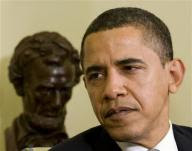CINCINNATI - Americans are furious at Wall Street bonuses and wearied by job losses, but many seem ready to give President
Barack Obama more time to deal with the nation's economic crisis.
After his second prime-time news conference to defend the decisions he's made since taking office two months ago, Obama appears to enjoy the confidence -- or at least th

e patience -- of ordinary Americans anxious about the economy.
"I think he's done a pretty good job so far, and I didn't vote for him," said Jack Sizer, a Connecticut physician and management consultant, as he read the morning paper in a Cincinnati coffee shop. "Doing something, even if it doesn't work out, is probably a good thing. He's taking action versus inaction," said Sizer, 71, a self-described conservative.
Across the country in Phoenix, Arizona, former mortgage banker Sean Klasen said he was not expecting miracles in Obama's first 100 days in office -- the traditional time frame many use to judge new American presidents.
"I think right now people are going to be willing to give him a chance, especially considering what we went through with the last administration," said Klasen, who has returned to college to train as an accountant after the housing meltdown cut short his mortgage career.
Obama has gone on the offensive in recent days to explain his economic goals and decisions, appearing on a popular late-night talk show last week in addition to his high-profile televised news conference.
The communications effort seems to have helped preserve the Democratic president's approval ratings, which two separate polls show are hovering near a healthy 63 percent or 64 percent some 60 days after Obama took over the Oval Office.
Obama won 52 percent of the popular vote in November's presidential election, defeating Republican
John McCain.
In San Francisco, paralegal Sean O'Brien said he thought Obama's performance on Tuesday night was "pretty good," especially given the challenges that face the country.
Since the recession began in December 2007, some 4.4 million jobs have been lost. More than half disappeared in the last four months alone.
'A TREMENDOUS JOB'
"I think he is doing a tremendous job under extremely adverse circumstances. Yeah, the AIG thing was kind of a real disaster, but I anticipated there would be a few disasters," said O'Brien, 48. "With time things will get better."
Obama and others have come under fire for allowing employees at failed insurance giant American International Group to give out $165 million in bonuses after the company received a $180 billion government bailout, an example of Wall Street excess that hit a nerve across America.
In Overland Park, Kansas, financial manager Kimberly Tassone said that while she was disappointed Obama made little mention of the wars in Iraq and Afghanistan on Tuesday, she was pleased with his moves so far to address the financial crisis.
"I do think there has been a substantial amount of progress in the short duration of his presidency so far, but to say 'Problem solved' ... I think that will take a long time," said Tassone, 32, a registered independent who voted for Obama.
But even supporters of Obama said it was difficult to know whether the decisions he has taken were doing any good.
Democrat Angela Shogren, out walking her dog Moby near the White House in Washington, said she watched Obama's news conference with her husband and isn't sure whether she is more or less encouraged by the actions of the president.
"It was a lot of the same, a lot of talk here and everywhere on what's getting done and people are anxious to see results and I don't think we are yet," said Shogren, 28, who is looking for a job in public relations, adding that her job hunt was going "slow."
And not everyone was willing to give Obama more time.
"I strongly disapprove of his actions so far," said Boston business executive Randy Waters, arguing that Obama didn't seem to be able to collaborate with lawmakers in Congress.
"He says the Republicans have not provided alternatives. I've heard lots of alternatives from Republicans and even Democrats, but he discounts them as unacceptable," said Waters, who has a son in the Army due to be deployed to Afghanistan.
In a suburb of Dallas, McCain supporter and retired civil servant Robert Schultz said he didn't bother to watch Obama's news conference.
"I had no interest in what he was going to say. To me it doesn't make any difference what he says. The only thing that's constant from his campaign is that he's going to tax some people, somehow, to increase welfare payments in the country," said Schultz, who watched a hockey game instead.
But even Schultz, who worries Obama is a socialist, said Obama needs more time before his presidency can be judged.
"It's way too early."
(Reuters)
 Just 49 percent of Americans believed that foreign leaders respected Bush shortly after he assumed office in 2001.
Just 49 percent of Americans believed that foreign leaders respected Bush shortly after he assumed office in 2001. 
























